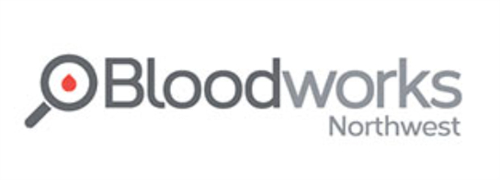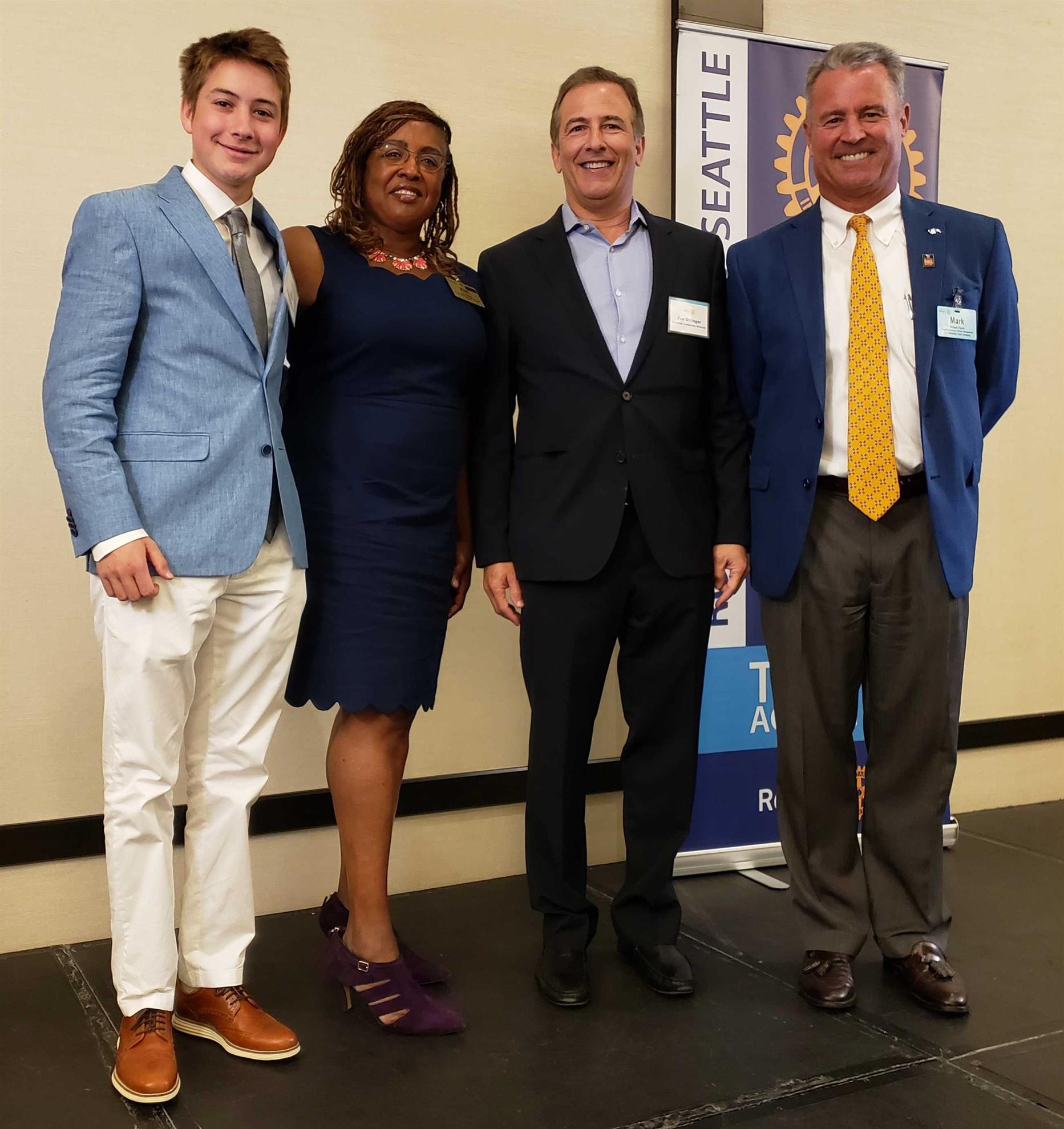 Our member Mark Davis introduced our keynote speaker, Joe Ottinger, who he met 20 years ago through a former member Walter Schoenfeld who was Joe’s father-in-law.
Our member Mark Davis introduced our keynote speaker, Joe Ottinger, who he met 20 years ago through a former member Walter Schoenfeld who was Joe’s father-in-law.Joe is the founder and CEO of Iinnovate that is based in Seattle. He is the author of two books, “Beyond Success: Building a Personal, Financial and Philanthropic Legacy” and “iInnovate- a guide for engaging in the innovation economy.” Iinnovate “helps implement strategic change to accelerate growth and profit.”
He started off by congratulating Jack Fleischmann for his excellent presentation during the short program.
He and Iinnovate have produced a 70-page report with the University of Washington that “is committed to providing insights into the Greater Seattle tech and innovation ecosystem that will be helpful to entrepreneurial leaders.” The report “collects information to help us better understand the networks of investors and advisors that exist” and how our area compares to other regions. Get a copy of their fourth annual report here.
He traced the history of our state’s innovation economy all the way back to Henry Yesler in 1851, which then moved to Frederick Weyerhaeuser who kicked off the state being a leader in the timber industry, which at one point included 63% of the state’s wage workers! He then moved to William Boeing and the start of the aerospace industry, the World’s Fair in 1962, and into the founding of Microsoft by Bill Gates and Paul Allen in the 70’s, and eventually Amazon by Jeff Bezos.
.jpg) He showed an interesting chart that listed the top employment sectors in our state which includes tech but also forestry which is still in the top eight. The graphic demonstrated “how well diversified our state’s economy” is with these eight sectors.
He showed an interesting chart that listed the top employment sectors in our state which includes tech but also forestry which is still in the top eight. The graphic demonstrated “how well diversified our state’s economy” is with these eight sectors.Joe went through our region’s strengths and challenges:
- Regional innovation and competitiveness receives a “mixed” grade due to the fact that we are creating more STEM jobs than we can fill and we have significant challenges that include education, high speed broadband penetration and quality of life.
- Global competitiveness is “improving.” This is the first time we have been included on the global list.
- Our state’s start up ecosystem is “improving” as it is creating jobs and economic value.
Four areas he discussed were:
- Tech talent – there is a “war for tech talent” and the demand for tech workers is increasing. We need to graduate more tech workers and more women are needed. We need to address the quality of life issue or the talent we have now will leave for other cities.
- Rapid change and disruption. It’s estimated that 75% of the S&P will be replaced by 2027! This shows that “even the most successful firms are not immune to disruption.”
- Innovation Opportunities – companies need to “apply technology strategically” and companies “need to build an innovation engine.”
- New leadership capabilities and mindset – companies need to understand how to innovate. You are at risk “without mastering innovation and change.”
He quizzed us to answer these questions from his presentation:
- Of the top 10 office lease tenants in the Seattle are, how many are tech companies = eight soon to be nine of the top 10.
- What is the percentage of tech workers from outside the area = 80%
- How many tech companies are led by women = less than 8%
He summarized that you need to focus on items that you can control and answered questions on:
The lack of VC companies in Seattle: he agreed that this is an issue as we need more VC companies and it’s tough to address how to get them to locate and invest here and that we especially need early-stage VC investment. He mentioned that government can play a role and that he was encouraged that five new VC companies have recently started.
How does the US rate compare to other countries? (similar to what he did with how our region ranks against other areas around the county). This worries him especially compared to China. He said that China will overtake the US at some point if current trends hold, though China does not have a level playing field. “The US has lost its edge based on where we were and where we are today.”
And his thoughts on tech companies like Amazon giving back to the community: he reminded us that Bill Gates’s father started the Gates Foundation. He said that at some point Jeff Bezos will “bring about the greatest change in philanthropy, when he’s ready, but that Amazon as a company can do more” and that New York “lost an unbelievable opportunity” due to the growth and opportunity that Amazon’s second headquarters would have created there.
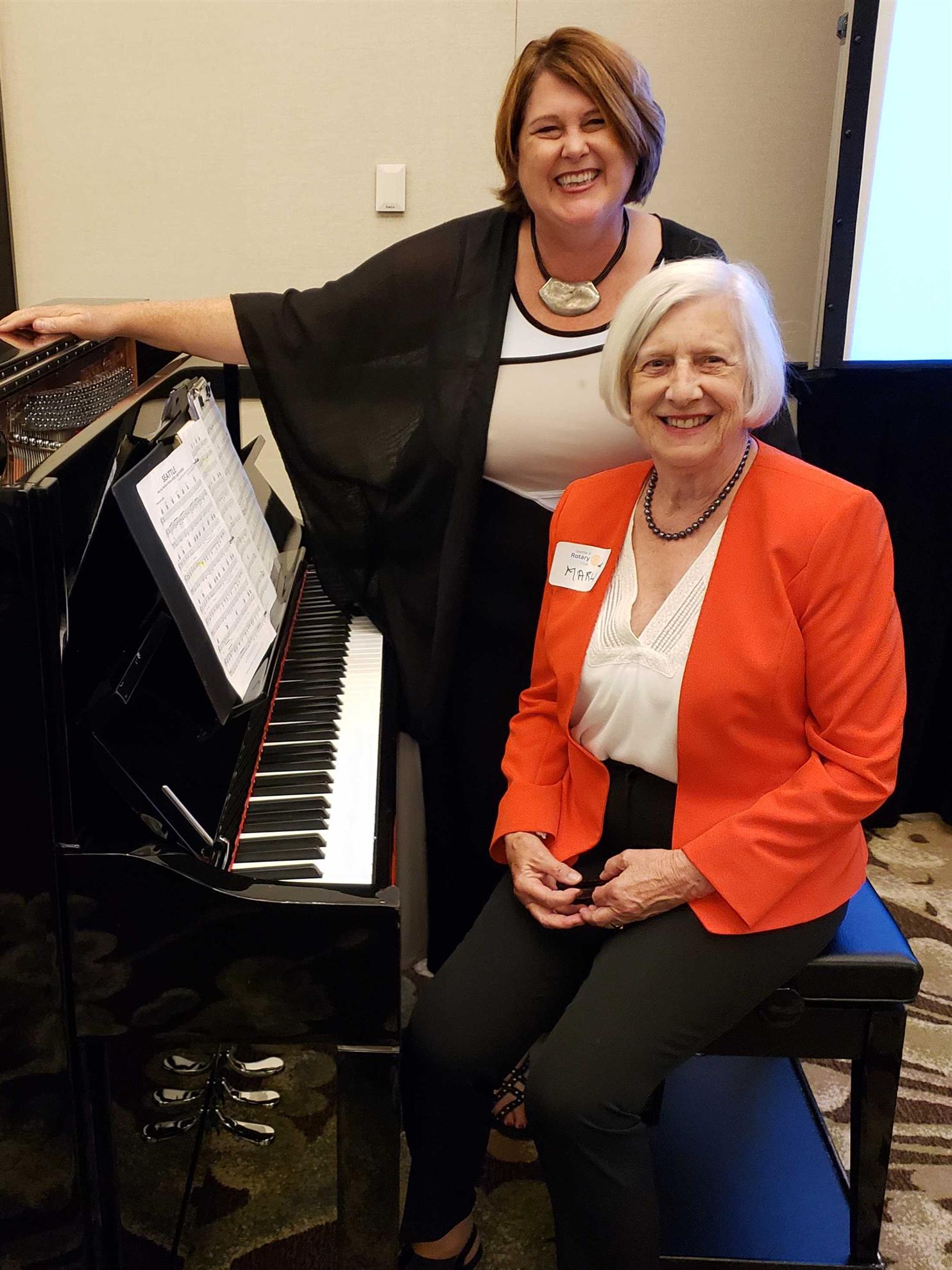 President Kim opened our meeting on a beautiful summer day and reminded us in the spirit of today’s main speaker talking about Seattle’s innovative economy that “Rotary is making positive change and creating lasting change. We are change-makers and innovators by creating something new and valuable.”
President Kim opened our meeting on a beautiful summer day and reminded us in the spirit of today’s main speaker talking about Seattle’s innovative economy that “Rotary is making positive change and creating lasting change. We are change-makers and innovators by creating something new and valuable.”She introduced Lauri Hennessey who led us in “Seattle,” a song that Perry Como made famous. She was accompanied by Marli Iverson on piano. Lauri mentioned that some of the lyrics reflected on your children leaving the house and going off to college which she is now facing with her youngest child.
One of our guests included former member, Bob Wiley, Jr., who was back in town from North Carolina to celebrate his father’s 90th birthday!
Jane Pryor introduced new member Alicia Flatt who is from White Rock, BC and holds dual US and Canadian citizenship. She has the classification of “Technology” and works at Qumolo based in Seattle. Jane mentioned that she is “helping and inspiring others like Terry Fox and Rotarians around the world.”
And Bailee Neyland introduced us to Caitlin Grant, a Gonzaga grad who joins with an “Accounting” classification who “fell in love with Rotary” after being recently introduced to our club. Bailee mentioned that if you “want fun conversation, then introduce yourself to Caitlin and you will be wowed like she was.”
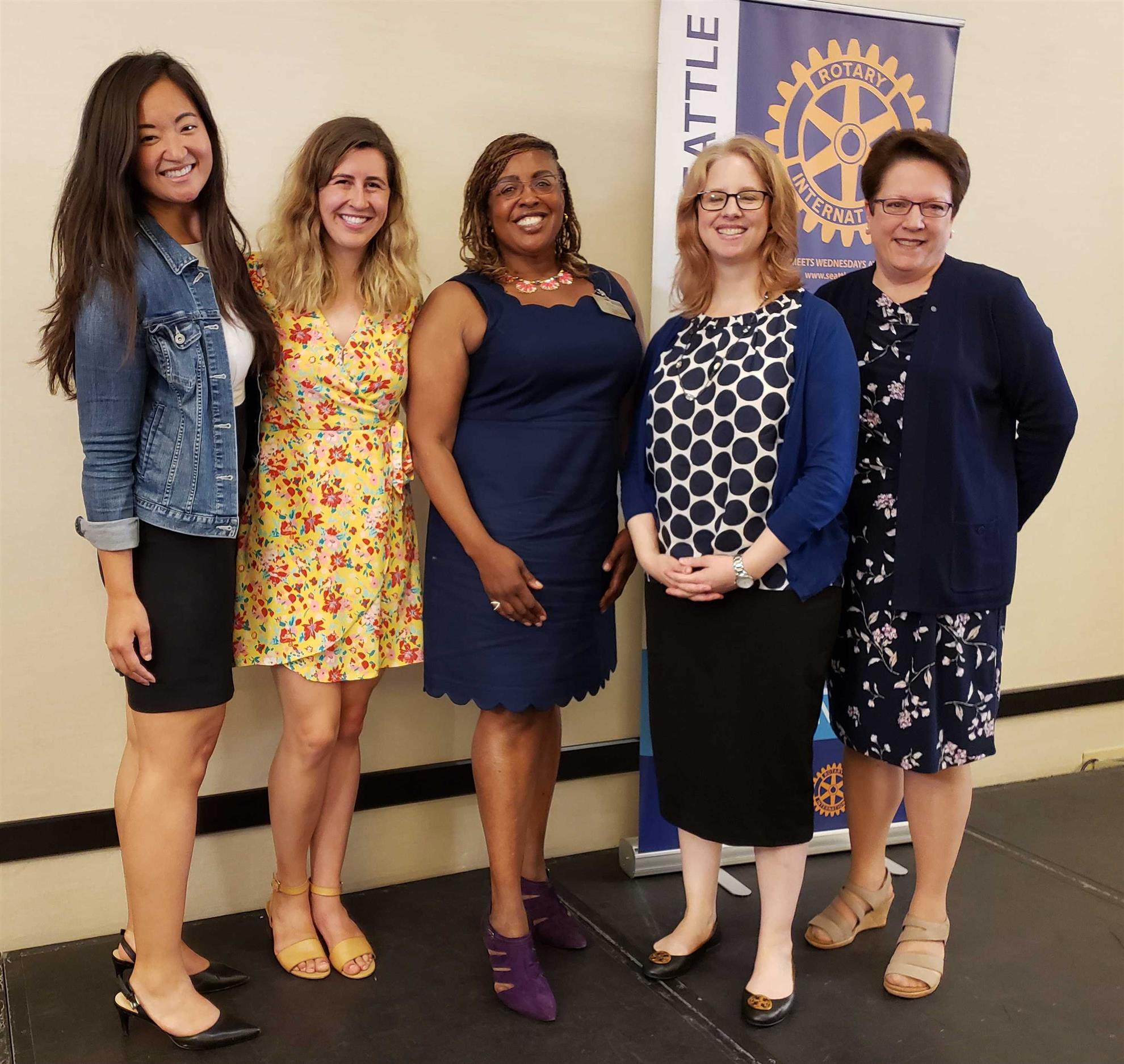 We were then treated to an inspiring short program by 18-year old, Seattle Academy student, Jack Fleischmann who shared his work with the Friendship Circle of Washington. Jack mentioned that he was struggling in grade school and high school. He was trying to impress his friends and “focused on being liked.” He was having a hard time at school while also suffering from OCD and anxiety until someone encouraged him to volunteer. He said that worrying and anxiety used to take him over, but now thanks to the help of his new friends with special needs who are part of The Friendship Circle, he is more fulfilled and happy. He has “fallen in love” with the Friendship Circle as it has enabled him to “escape from the challenges of life and empowered him to alter his life.” He said he “now has a purpose and wants to be a leader and is motivated to work hard,” thanks to the true friendships that he has developed as a volunteer with the Friendship Circle. He thanked us “for allowing him to share his story.” It was us who thanked him for inspiring us and we responded with a standing ovation.
We were then treated to an inspiring short program by 18-year old, Seattle Academy student, Jack Fleischmann who shared his work with the Friendship Circle of Washington. Jack mentioned that he was struggling in grade school and high school. He was trying to impress his friends and “focused on being liked.” He was having a hard time at school while also suffering from OCD and anxiety until someone encouraged him to volunteer. He said that worrying and anxiety used to take him over, but now thanks to the help of his new friends with special needs who are part of The Friendship Circle, he is more fulfilled and happy. He has “fallen in love” with the Friendship Circle as it has enabled him to “escape from the challenges of life and empowered him to alter his life.” He said he “now has a purpose and wants to be a leader and is motivated to work hard,” thanks to the true friendships that he has developed as a volunteer with the Friendship Circle. He thanked us “for allowing him to share his story.” It was us who thanked him for inspiring us and we responded with a standing ovation.President Kim announced that we will start a series of club “Table Talks” that will be focused on a series of questions that the board has developed. The series will kick off at next week’s meeting with, “How can we better articulate the path to leadership in our club?”
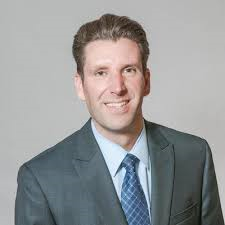 Dann Mead Smith
Dann Mead SmithTotem Reporter
